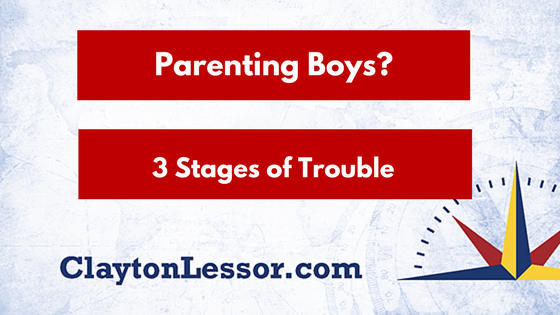Parenting Boys? 3 Stages of Trouble

When parenting boys, most parents can’t believe their son is troubled. What in the world does he have to be troubled about?
It’s interesting the word troubled can be perceived differently to each of us. An example of two extremes is: “being afraid to talk to a girl (mild),” to “committing a crime (severe).” When I say, every boy is troubled, the only question is to what degree or level. I frequently use this scale as a guide when parenting boys:
- severe
- moderate
- mild
Parenting Boys: The Research
More than 2,000 boys have gone through my program, all were troubled at some level. My research confirms the “trouble” is systemic(related) directly to the relationship, or lack thereof, between fathers and sons. How can that be you ask?
Most all adolescent boys are carrying a wound. Typically, it’s a “dad wound” and that translates to trouble.
What is a “dad wound?” Maybe dad abandoned him emotionally or physically. This wound is the most severe and carries a high level of trouble, if not addressed and dealt with will be carried into his adult life.
Adolescent boys are innately hungry for Dads approval and attention because they are male-dad is male and that equates to an innate draw (the man I will potentially look like). If they don’t receive it, it is one of the most damaging experiences in their young life. Many times, when dad says or does something abusive the boy never gets over it, he carries it-mild to moderate.
Another issue I often see is the boy is being bullied. He would most likely keep that to himself (boys internalize their emotions) and over time, the anger he has will show itself in some form of trouble-severe.
A break-up with a girlfriend, or in general, he feels rejected by his peers leads to mild to moderate trouble. Unfortunately, the list is long but you get the idea.
Parenting Boys: Signs of Trouble to Watch For
- emotional changes
- sadness or hopelessness
- irritability, anger, or hostility
- withdrawal from friends and family
- feelings of worthlessness, guilt, fixation on past failures
- self-blame or self-criticism
- trouble thinking or concentrating
- ongoing sense that life and the future are grim and bleak
- frequent thoughts of death, dying or suicide
- changes in eating and sleeping habits
Better Safe Than Sorry
Troubled boys can be tricky to deal with. It can be hard for a parent to distinguish between normal adolescent mood swings and something more severe.
Do you suspect trouble? Seek out a counselor who specializes in dealing with adolescent boys. In The Quest Project® I work with boys in age appropriate groups for 10 weeks. Through an established set of processes, I can determine what is troubling them and help heal the wound. Talk to his school counselor, a friend or local mental health resource center. Or, make an appointment with your son’s doctor (I don’t advocate medication; I do advocate getting to the root of the trouble and resolving it).
Your son is troubled and you don’t know what to do next? Share your concern, maybe I can help.



